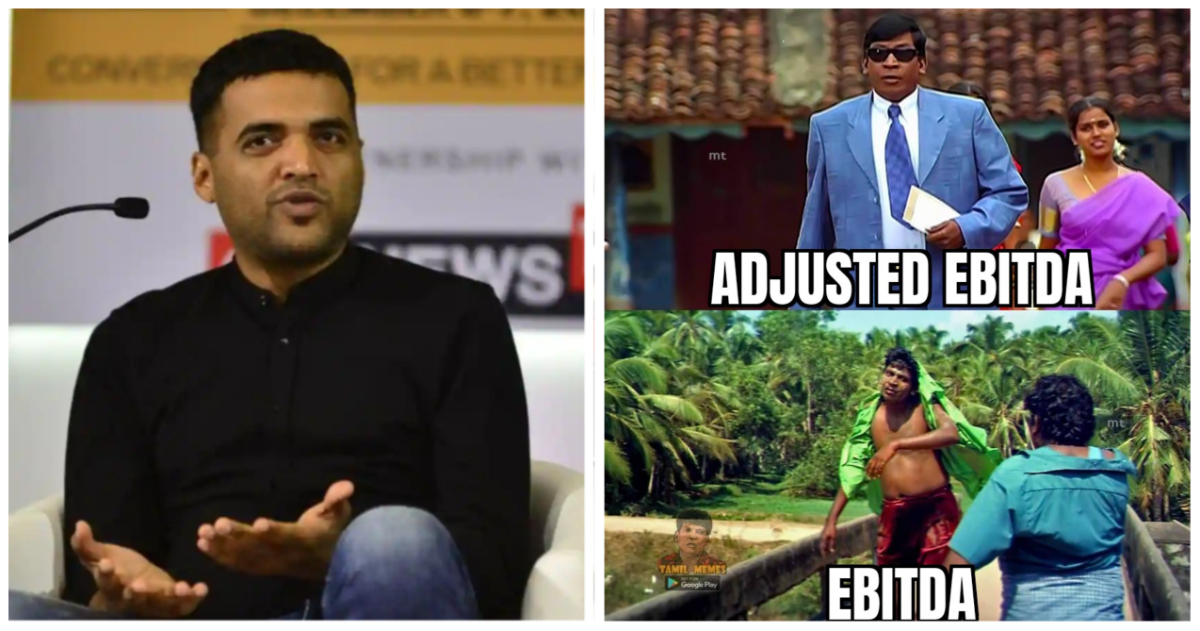Startups might be getting creative in how they represent their financial data, but India’s netizens aren’t particularly impressed.
Zomato has been trolled on social media after releasing its Q3 numbers late last evening. Zomato’s numbers included several innovate metrics, including “adjusted” revenue and “adjusted” EBITDA, and “ex-Blinkit”, which removed the losses incurred by the hyperlocal startup it had acquired last year. Zomato and other startups have come up with these numbers to buttress their financial results — adjusted EBITDA, for instance, doesn’t include employee stock option costs which are among a startup’s chief expenses, and attempts to paint a picture of profitability that would be hard to find under traditional metrics. But Twitter was quick to point out that these metrics were essentially made-up, and called out Zomato for its accounting shenanigans.
“My daughter thought Adjusted is the name of the company. Told her its Zomato,” wrote Twitter users Contrarian EPS, while sharing a picture of all the adjusted metrics Zomato had announced.
Another Twitter user pointed out how adjusted metrics didn’t adequately reflect the state of a company. “What does adjusted EDIDTA even mean? You cannot ignore any cost item. ICAI should clarify the validity of these metrics Startups are using these metrics as a joke to inflate profitability and build incorrect narratives!” they said.
While there was some anger, soon the jokes began as well. “If I don’t count banana chips, murukku & pepper peanuts, my diet is perfect. #Adjusted EBITDA,” wrote a Twitter user.
“Adjusted for all my belly fat, I’ve lost weight,” wrote another.
Soon people began coming up with all kinds of adjusted metrics on their own. “Adjusted for Bangalore traffic, I’m always on time,” a user said.
People began throwing in cricket references too. “Adjusted for lost wickets, Australia batted well,” wrote a user.
Soon the memes began.
Some Twitter accounts were a lot more direct — “Adjusted for one off, Zomato’s fair price is Rs 10/share,” wrote one.
Zomato CEO Deepinder Goyal also came under heavy fire for claiming that Zomato became “EBITDA positive (ex Blinkit)” in January. “This is like saying I am debt free (ex all loans I have to repay)” wrote financial analyst Darshan Mehta.
“Ex wife, I am a bachelor,” joked another user.
Others were even more direct. “It is like saying I am rich (ex money),” wrote a Twitter user.
Someone even calculated the number of times the word “adjusted” appeared in Zomato’s shareholders’ letter — it turned out Zomato had used the word 32 times.
Others tried to be as creative as Zomato. “Congress made massive gains among masses (ex Rahul Gandhi),” wrote a user.
Zomato’s quarterly results hadn’t been the strongest. While the company had grown its revenues by 75%, losses surged 450% over the same period. Investors would’ve been curious about how the company planned to finally start making money, but judging by the online reactions, coming up with new metrics to define profitability wasn’t quite the strategy the street was expecting.
